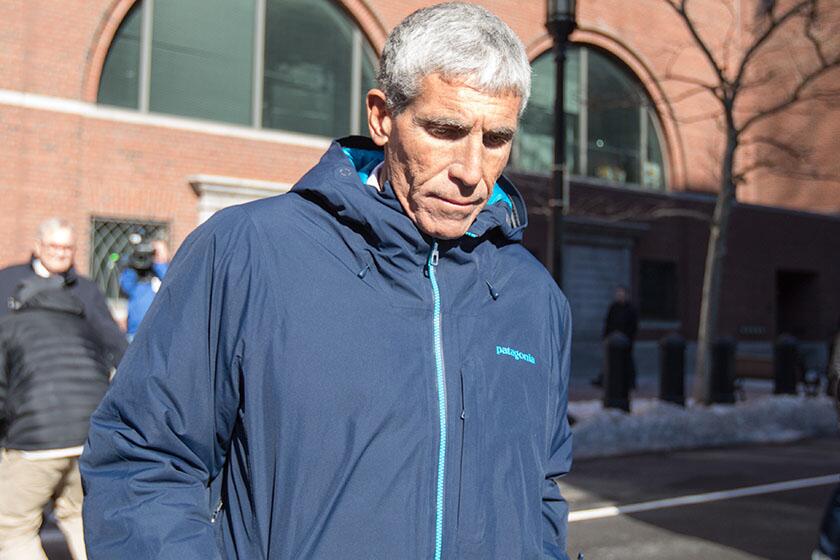âVarsity Bluesâ: Former USC administrator Donna Heinel sentenced to 6 months in prison

In the flurry of headlines surrounding the âVarsity Bluesâ scandal, it might have been easy to overlook Donna Heinel.
The 61-year-old Southern California woman was not like dozens of others charged in the nationwide scam, not a big-time college coach nor a wealthy executive, nor a famous television actress.
But the former USC administrator played a behind-the-scenes role in helping an alleged two dozen unqualified students gain admission to her school, passing them off as talented athletes even if they didnât play sports.
And on Friday, when U.S. District Judge Indira Talwani in Boston sentenced her to six months in prison and two yearsâ supervised release her case continued to raise troubling questions. Prosecutors had sought a 24-month prison term.
Federal prosecutors say their investigation dubbed Operation Varsity Blues blows the lid off an audacious college admissions fraud scheme aimed at getting the children of the rich and powerful into elite universities.
On one hand, prosecutors labeled her as âone of the most-prolific and culpable participantsâ in a massive scheme that saw affluent parents pay millions in bribes to coaches and administrators to get their kids admitted to elite schools across the country.
On the other, Heinel claimed that she had been coerced into wrongdoing. As her attorney stated in a memorandum submitted to the court, her crimes were âthe product of the pressures put upon her by a dysfunctional university school system at USC and the powerful men who inhabited her orbit.â
The federal investigation known as âOperation Varsity Bluesâ has uncovered admissions fraud on other elite campuses, such as Stanford, Yale, Georgetown and UCLA. It has, so far, resulted in 53 convictions.
The schemeâs mastermind, a private consultant named William âRickâ Singer, was sentenced to three years and six months in prison this week after cooperating with investigators. Singer was able to work âside doorâ admissions for the children of his clients by cultivating relationships with coaches and administrators.
Many of those deals involved USC.
Actress Lori Loughlin and her husband, fashion designer J. Mossimo Giannulli, served brief prison sentences after paying Singer $500,000 to have their two daughters portrayed as crew recruits, though neither teenager was a rower. Actress Felicity Huffman pleaded guilty to disguising a $15,000 donation to rig a college entrance exam for her daughter.
Several USC coaches were arrested for taking bribes. Former soccer coach Ali Khosroshahin was sentenced to home confinement and water polo coach Jovan Vavic was convicted but later granted a new trial.
Heinel, who worked closely with Singer for years, was fired as USCâs senior associate athletic director and senior womenâs administrator after her 2019 indictment. She pleaded guilty to wire fraud in November 2021.
William âRickâ Singer bribed coaches and rigged exams to slip the children of his star-studded clientele into the countryâs best universities.
During the past two months, prosecutors and defense attorneys filed sentencing memorandums, a common procedure that has each side making its best â if occasionally hyperbolic â argument for an appropriate punishment. The documents offered two very different portraits of the defendant.
The defense memorandum describes a âdark underbellyâ within the USC athletic department that Heinel says she encountered soon after beginning work there as a volunteer intern in 2003.
At issue were âwalk-onâ spots â roster slots given to nonscholarship players. Some might mature into Division I-caliber athletes, others might never see game action but can be useful for team practices.
Heinel contended that her bosses sometimes dangled these spots before the sons and daughters of wealthy families in a not-so-subtle attempt to wrangle large donations from the parents.
âDespite how offensive Dr. Heinel found the use of walk-on spots as a fundraising mechanism, it was how she was taught to do her job,â defense attorney Nina Marino wrote in the memorandum for her client.
Heinel eventually worked her way up to the senior associate level under former athletic director Pat Haden. It was Haden, she said, who introduced her to Singer as someone who might help the department raise money.
Federal investigators are scrutinizing whether Pat Haden, the former USC athletic director, was involved in the college admissions bribery and cheating scheme carried out by William âRickâ Singer, according to a source with knowledge of the case.
The situation grew worse when Lynn Swann took over as athletic director in 2016, Heinel claimed. The new boss broadened her responsibilities as she sought to attract large donations while also acting as a liaison between athletics and the university admissions department.
âThe pressure increased,â her memorandum stated.
It was around that time, prosecutors claim, that Heinel moved beyond just offering walk-on spots to marginal athletes from affluent families. Working with Singer, she allegedly began creating false athletic histories and phony action shots for applicants.
These doctored biographies were submitted to an athletics subcommittee of the admissions board, the government said, âpresenting the students as recruits to USCâs athletic teams when, in reality, the coaches had not recruited them and some did not even play the sport.â
In this way, Heinel attracted more than $1 million in athletic department donations from Singer and his clients over approximately four years, prosecutors said. They contend she acted purely from self-interest to further her career.
For the record:
12:17 p.m. Jan. 6, 2023An earlier version of this story incorrectly stated that Heinel was ordered to pay $160,000 in restitution. The judge ordered Heinel to pay forfeiture in the amount of $160,000.
Around 2017, they said, she took another significant step by arranging payments of $20,000 a month from Singer for personal benefit, receiving a total of $160,000. As part of her sentence, the judge ordered her to forfeit the amount of her personal gains.
USC athletic director Lynn Swann was in bed Tuesday when he received the call about the college admissions bribery scandal that would rock USC and several other schools around the nation.
âThere is no evidence that USC ever condoned Heinelâs criminal conduct,â the government memorandum stated.
Heinelâs attorney released a statement: âOur client is relieved to put this nightmare behind her and we are pleased the court recognized our clientâs lifetime of good works in imposing sentence.â
The lingering uncertainty around this case is not entirely resolved by evidence that includes page after page of redacted emails, texts and phone transcripts. Identities of the parties involved are often concealed and the language is often couched.
If nothing else, the defense memorandum suggests the USC athletic department put Heinel in a difficult position, asking her to oversee both fundraising and admissions.
âMoney and admissions should never be mixed at a university,â the filing stated, adding that Heinelâs âconduct is the unfortunate result of a woman trapped in an unworkable job description.â
More to Read
Go beyond the scoreboard
Get the latest on L.A.'s teams in the daily Sports Report newsletter.
You may occasionally receive promotional content from the Los Angeles Times.










